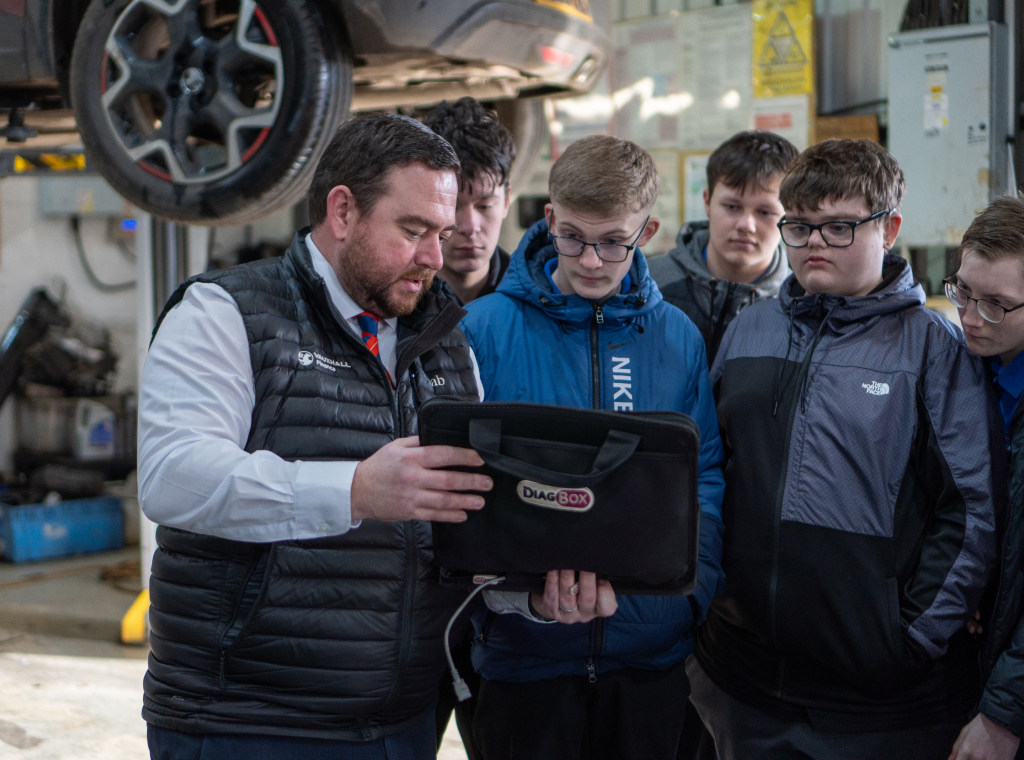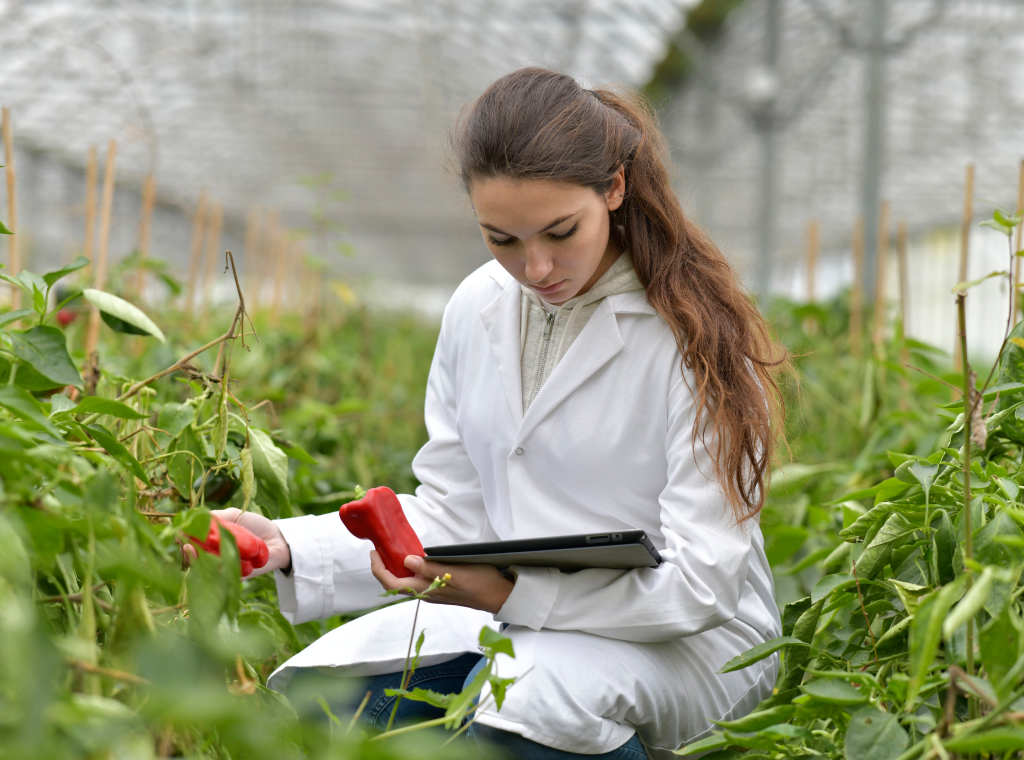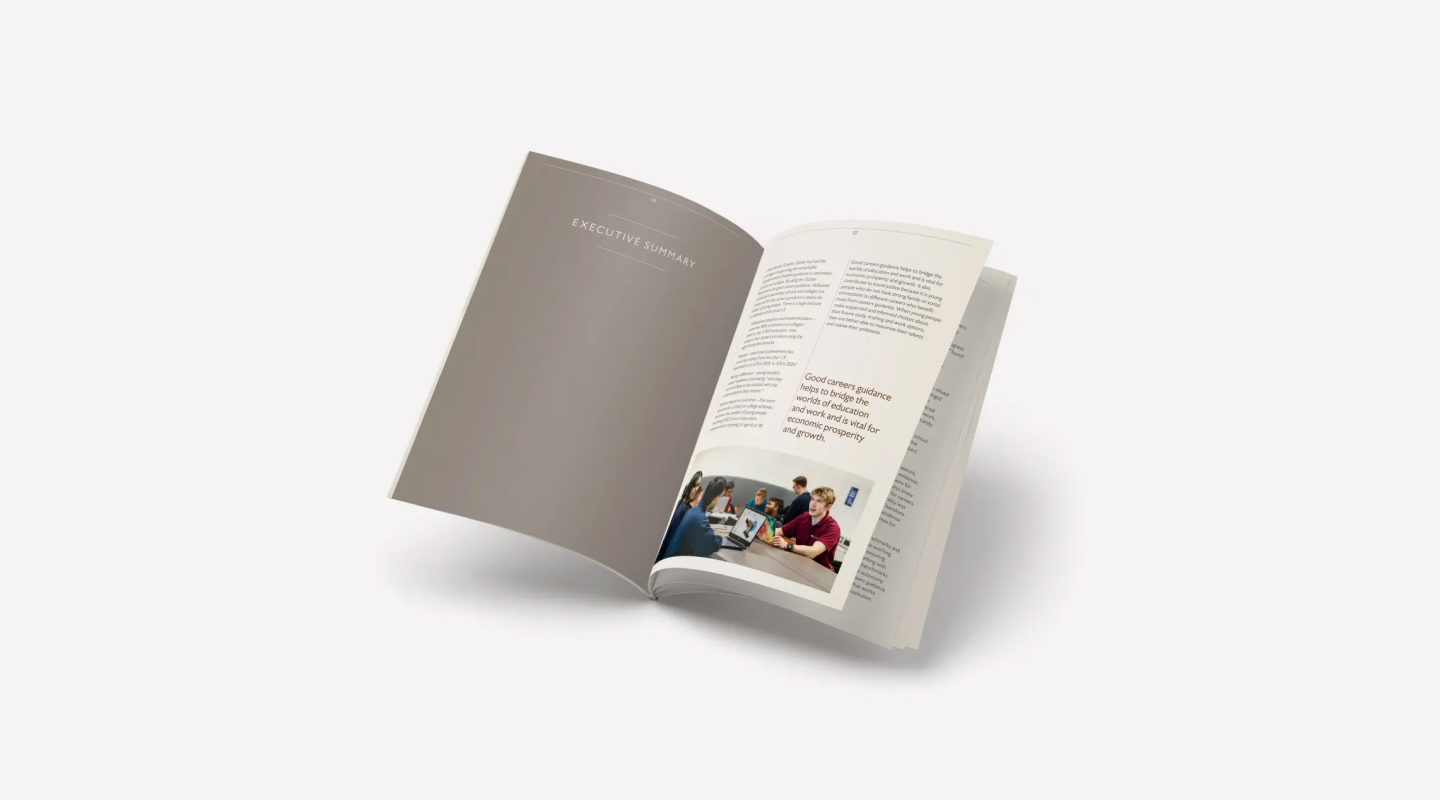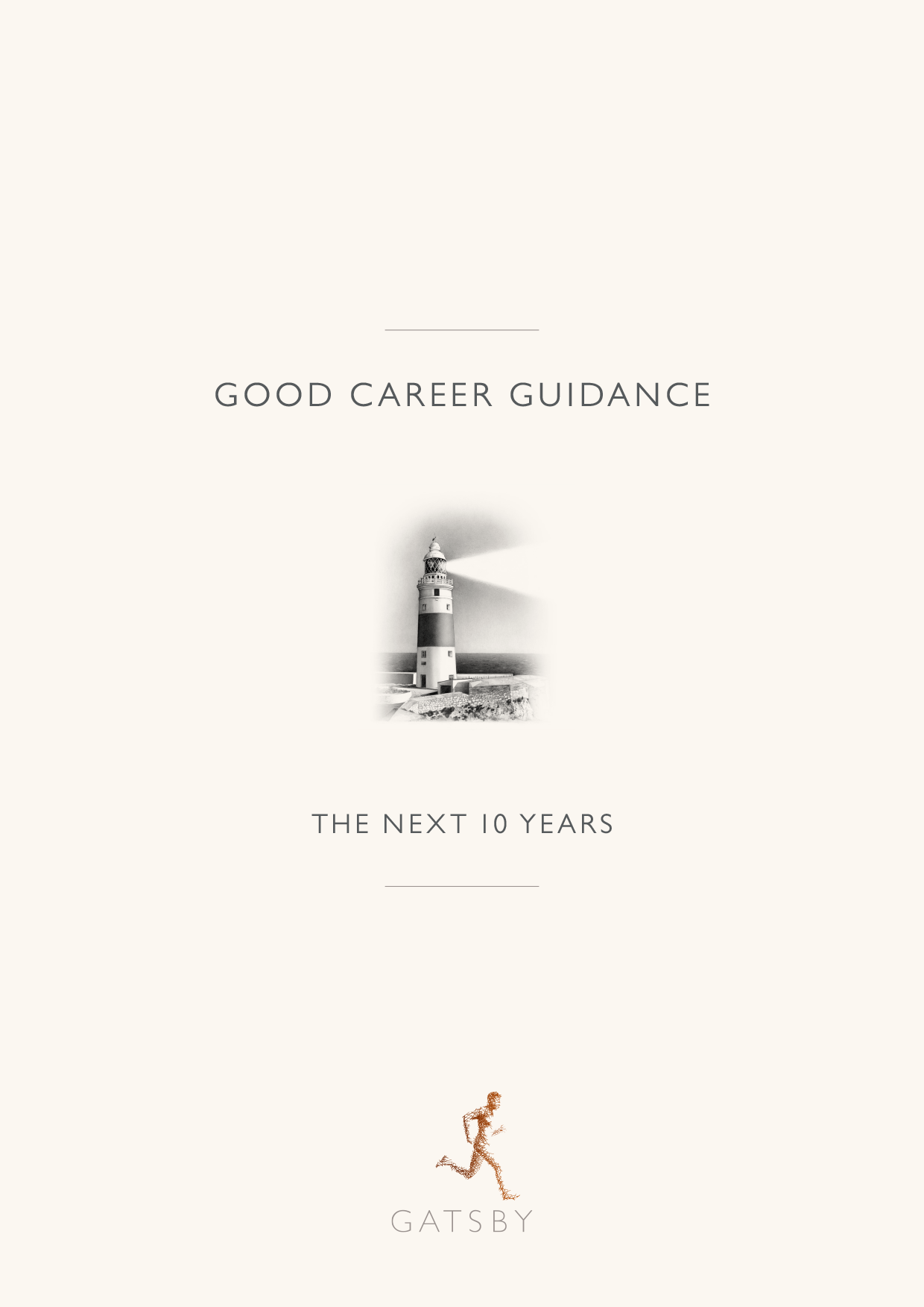A guide toGatsby Benchmark 6
Experiences of workplaces
Every learner should have first-hand experiences of workplaces to help their exploration of career opportunities and expand their networks.

Criteria for Schools
- By the age of 16, every pupil should have had meaningful experiences of workplaces.
- By the age of 18, every pupil should have had at least one further meaningful experience.
Every school should have an embedded programme of careers education and guidance that is known and understood by pupils, parents and carers, staff, governors, employers and other agencies.



Criteria for colleges
- By the end of their programme of study, every learner should have had at least one meaningful experience of a workplace, in addition to any part-time jobs they may have.


Definition of ‘Meaningful’ for Benchmark 6
A meaningful experience gives the young person the opportunity to explore what it is like to work in that environment, what skills are valued in the workplace, their recruitment processes and what it takes to be successful. This could be achieved through visits to workplaces, work shadowing and/or work experience. Throughout the careers programme these experiences could be in person or a combination of in person and virtual, where appropriate.
Both the young person and employers should be supported to prepare for the experience. Additional or different support may be needed for vulnerable and disadvantaged young people and for young people with special educational needs and disabilities (SEND).
A meaningful experience will:
- have a clear purpose, which is shared with the employer and the young person
- be underpinned by learning outcomes that are appropriate to the needs of the young person
- involve extensive two-way interactions between the young person and employees
- include opportunities for young people to meet a range of different people from the workplace
- include opportunities for young people to perform a task set by the employer or to produce a piece of work relevant to that workplace
- include the employer providing feedback to the young person about their work
- be followed by opportunities for the young person to reflect on the insights, knowledge or skills gained through their experience
Schools, colleges and independent training providers (ITPs) can take into account any part-time work a young person may have, if it genuinely offers them a meaningful experience.
Research shows that young people who have had multi-day experiences of workplaces tend to have higher wages when they are in full-time employment.
Good Career Guidance: The Next 10 Years
Case Study: Astrea Academy
Astrea Academy Dearne used to offer a two-week work experience programme,
but it became clear that young people whose families had stronger professional connections benefited more than those who did not. Therefore, the school now offers young people an employer project-based approach to workplace experiences.
Activity takes place over the full academic year. Young people are given preparation
time to research job sectors during personal, social, health and economic (PSHE) education sessions and in form time. Lessons cover application forms, interviews, professional conduct, health and safety in the workplace and how to use public transport.
Young people are selected from the application forms they complete in lessons and are allocated to their employer who sets them a workplace-related small-group task. They visit the employer in groups to learn about the company, meet staff in different roles and work on their task. Each employer mentors their group once a month, either
at the school, in the workplace or online.
After all young people have completed their experiences, a business networking event is held at the school. Each employer is invited
to attend, along with other businesses from across South Yorkshire. Groups of young people, supported by their employer mentor, present their work to their peers, leaders from industry and senior leaders from the school and multi-academy trust (MAT).
Case Study: VolkerRail
VolkerRail, a railway systems and infrastructure contractor based in Doncaster, uses strong partnerships with education to both address skills gaps in their workforce and help young people understand what it is like to work in the rail industry. The experiences of the workplace they offer to young people vary in format and length, but all are designed to give an insight into the wider sector, an overview of the business and an opportunity to experience different departments.
Young people meet staff, including apprentices and senior managers, and are set practical work tasks. Those experiencing multi-day visits are assigned mentors who provide support with tasks or projects. Employees provide feedback and young people are asked to reflect on their experiences, which supports their development and informs programme improvements. VolkerRail
staff also provide in-person or virtual talks and science, technology, engineering and mathematics (STEM) activities linked to the curriculum, attend school and college careers fairs, and take part in larger events, such as national science and engineering roadshows.
Case Study: Learning Curve Group
The ethos of Learning Curve Group, an ITP, is to transform lives through learning. A full-time careers leader is responsible for developing the institution’s careers strategy and implementing the careers programme. The careers programme outlines the whole-institution approach to careers and its objectives, as well as setting out the responsibilities of everyone involved. The careers leader ensures every young person receives the careers support they need to make well-informed choices.


T-level industry placement
T-levels are large Level 3 programmes with content that is developed in collaboration with employers and aligned to the same national occupational standards as apprenticeships. Approximately 20% (typically 45 days) of a young person’s time during a T-level is spent on industry placement with
an employer relevant to their subject. The placement develops the knowledge, skills
and behaviours specified in the T-level, while giving young people a window into the world of work to support their decision-making.
T-levels have been gradually rolled out across the country since 2020, and young people have progressed from them into skilled employment, apprenticeships and related further or higher education.
It’s like they’ve just been with us for years, they’ve been brilliant. They’ve captured the culture of our business.
Head of Corporate Services, Ocean Ecology
I enjoy the [industry placement] because it provides me with inside knowledge on what a business is actually like and how I can develop that knowledge to progress.
Digital T-level Student
Our young people need to be out there, and they need to see the real world so that they can learn how to cope in that unfamiliar environment. Once they see that they can cope, we often see them thrive.
Careers Leader, River Tees Secondary Academy
Case study: River Tees
At River Tees Secondary Academy, an alternative provision school, experiences of workplaces have been prioritised:
Small groups are given opportunities for multi-day visits, for example Year 10 students have visited a thermal insulation company. As part of each visit, young people are given a company overview, meet key staff and are set tasks, receiving feedback on what they have done. Preparation and familiarisation are key. Each young person or group is taken on a pre-experience visit to the workplace to explore the placement environment and find out where they will be working, who they will be working with and what they need to wear. This process is overseen by a member of school staff who knows the needs and aspirations of each young person and plans the experience with the employer accordingly.
Case study: Fairfield College
Fairfield College, a specialist college for young people with additional needs, has introduced an innovative tiered approach to Benchmark 6. Young people explore the college as a workplace and participate in work-based learning at college sites in roles such as hospitality, animal care, administration and retail. If appropriate, they then progress to multi-day workplace visits outside the college, which are supervised and supported by a member of staff. Some young people then progress to an unsupervised external work placement. Community-based travel training helps make sure the experiences are accessible to all and the careers leader works closely with other key staff to ensure that the young people and the employers are fully prepared.
Case study: Catcote Academy
Job coaches at Catcote Academy, a special school, work closely with employers before workplace experiences and provide ongoing support to young people in the employment setting. Support is gradually removed when the young person and the employer are ready. Experiences are integrated into the curriculum as part of the process of preparing young people for adulthood. Experiences include opportunities with local and international businesses such as the National Museum of the Royal Navy and NTH Solutions, a subsidiary of the NHS. They are always tailored to the individual needs of the young person, which are matched to the needs of the employer. Catcote Academy staff, including the lead for autism, provide professional development training for employers so that they feel confident they can meet the young people’s needs.
Case study: WWF Sustainable Futures Programme
The WWF Sustainable Futures programme143 equips young people to thrive in a green economy, whatever their career path. It provides careers leaders and teachers with the tools and guidance to help students to build a sustainable career. The programme was created with Villiers Park Educational Trust144 and Founders4Schools,145 and includes a student course, careers talks and experiences of workplaces, with sustainability threaded throughout. The experiences of workplaces are delivered through insight days, where students meet a variety of employees and work on a real sustainability challenge associated with that business or industry. Experiences of workplaces allow students to explore how sustainable thinking applies in different work contexts and how they can incorporate it into any career.
Case study: The West of England Mayoral Combined Authority
The West of England Mayoral Combined Authority has integrated its commitment to net zero in their employment and skills plan. Green skills and jobs will continue to grow, becoming more wide-ranging as industries work towards a sustainable net zero future. Developing a green skilled workforce is essential to how we transition towards a greener economy and meet our net zero emissions targets in the West of England … Across sectors, the green transition requires the evolution of both new and existing jobs.
Assistant Head, West of England Mayoral Combined Authority
The mayoral combined authority are embedding careers information and green skills into resources and experiences. This supports careers leaders and careers advisers to help young people explore local opportunities in the green sector. We heard about one project that supports schools to align their careers activity, including workplace experiences, with the regional green skills agenda.
Jump to Benchmark
Gatsby Benchmark 1
A stable careers programme
Gatsby Benchmark 2
Learning from career and labour market information
Gatsby Benchmark 3
Addressing the needs of each young person
Gatsby Benchmark 4
Linking curriculum learning to careers
Gatsby Benchmark 5
Encounters with employers and employees
Gatsby Benchmark 6
Experiences of workplaces
Gatsby Benchmark 7
Encounters with further and higher education
Gatsby Benchmark 8
Personal guidance


Publications
Browse our full collection of downloadable resources, including the reports themselves, associated appendixes and supporting literature.
